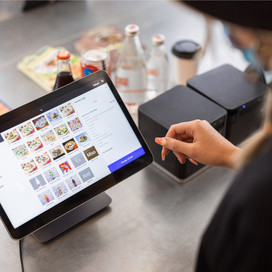Since launching in 2009, our objective at Square has always been to give businesses the tools and technology they need to fully participate in the economy. We now work with millions of business owners globally helping them run and grow their operations, no matter what stage their business is at — and we are constantly working to ensure that Square is secure platform for everyone.
Working to keep your business safe
Square has global teams dedicated to protecting both Square and the businesses that use us from fraudulent and illegal activity. We use live monitoring programs and algorithms that analyse transactions as they’re happening to detect unusual or suspicious activity. This helps intercept suspicious transactions before charges occur, protecting our sellers from product or service theft and chargebacks.
Occasionally this will mean that we’re unable to work with certain types of businesses, or that in some circumstances we are required to hold funds within a business account to protect from financial loss. This could be for a number of reasons, including suspicious account activity or a direct breach of Square’s Terms of Service. Ultimately, every action Square takes is made at our discretion taking all of the information we have available into account. This ensures that we’re protecting our sellers and their customers the best we can.
This article will give you an overview of how this process works at Square, and what it means if we get in touch for more information about your business.
Jump to:
- The Square Terms of Service
- Prohibited industries
- What it means when we request more information
- Holding funds
The Square Terms of Service
One of the ways we make sure Square is a safe platform for processing payments is through our Terms of Service. These rules set out the agreement between Square and each seller who uses our service. Every seller should take some time to become familiar with the full terms, to ensure Square is the best platform to support your business, before signing up.
If a seller is found to be in breach of Square’s Terms of Service, there are a number of steps that our account services team or compliance team may take to resolve the situation:
- We may reach out to the seller to inform them that they are in breach of our terms and will be deactivated, which means they will no longer be able to process payments with Square.
- We may contact the seller to confirm or obtain further information about the the products or services they are selling.
- If we are only able to support part of the seller’s activities or business, we may ask them to confirm that Square’s services will not be used to process payments for the specific products or services that are in breach of our terms.
If a seller continues to breach Square’s Terms of Service without resolution, we reserve the right to deactivate any non-compliant accounts. It is also worth noting all communications we make around compliance will occur with the nominated contact person on the Square account—so make sure you keep your account details up to date.
Unsupported Industries
There are a number of products and services that you are prohibited from selling with Square. Prohibited business categories may be imposed through our card network partners’ rules (For example: Visa, Mastercard, JCB, eftpos and American Express), the requirements of our financial services providers, or by Square. These items are listed in Section 3 of our Payment Terms, and explained in further detail below.
The types of businesses listed in the right column are representative, but not exhaustive. If you are uncertain as to whether your business is not supported by Square, or have questions about how these requirements apply to you, please contact Square’s local Support Team on 1800 760 137.
Illegal, infringing or regulated products or services
| Regulated products and services | Drugs, and tools specifically intended for the production, trafficking, use and sale of (illegal) drugs; marijuana dispensaries and related businesses; Internet/mail/telephone order of prescription drugs; online pharmacies; supplements that have controlled substances; pseudo-pharmaceuticals (e.g. weight-loss products, sexual stimulant or enhancement products); nutraceuticals (products marketed with claims of unsubstantiated health benefits); substances designed to mimic psychoactive products (e.g. salvia, bath salts, herbal smoking blends, kratom, alkaloid derivatives, synthetic cannabis); weapons (e.g. functioning firearms and parts, ammunition, hunting knives, swords); internet/mail/telephone sale of age-restricted products (e-cigarettes, vapes, accessories); products and services with varying legal status on a state-by-state basis; goods or services, the sale of which is illegal under applicable law in the jurisdictions to which your business is targeted or directed. |
| Infringement and counterfeit products | Counterfeit items, including but not limited to currency, coins, stamps, counterfeiting equipment, trademark infringement items, goods infringing on third party intellectual property rights; fake references and other services/products that foster deception (including fake IDs and government documents); ‘mod-chips’ to break the encryption of game computers to enable the playing of unlicensed copies of games; ‘TV box’ modified to access free streaming of current films/programs. Unauthorized sale or resale of brand name or designer products or services; sale of goods or services that are illegally imported or exported |
| False, misleading or deceptive advertising or marketing | Social media ‘click farms’ (e.g. sale of clicks/likes/reviews/endorsements on social media sites); ‘get rich quick’ schemes (e.g. real estate investment with no money down, work from home etc.); infomercial sales (purchase to learn more model); bidding fee auctions (a.k.a. penny auctions); products and services with unsubstantiated, exaggerated or bogus claim or that we determine in our sole discretion to be unfair, deceptive, or predatory towards consumers. |
| Adult products or services | Companion/escort services, prostitution; pornography in any medium, adult book or video businesses (excluding non-pornographic photography, art); adult websites and content (audio, video etc.); adult telephone conversations, live chats or any sexual services. |
| Betting, gambling | Buy-ins (e.g. poker, fantasy leagues); lottery tickets, casino gaming chips, off-track betting; wagers at races; online betting and gaming. |
| Country-related services | Freight services to Cuba, Cuban tourism services; payments associated to a sanctioned country |
| Hate or harmful products | Products such as Confederate flags, Nazi memorabilia, racist clothing, music or videos sold in a hateful context. That is, where these are being sold by groups that incite or encourage violence, hate crimes, harassment, or social disorder because of racism, bigotry, harassment, or other negative stereotypes. Ticket sales, subscriptions, donations, and other forms of direct support to such groups are also prohibited. Products and services invoking or supporting racism, violence, abuse, discrimination, hatred, terrorism, paedophilia, or other immoral activity. |
Financial and marketing products and services
| Financial services | Credit protection/repair/restoration; debt/interest consolidation or reduction services; investment programs/businesses; mortgage/loan modification; debt collection; financing of automobiles; payday loans; cash advancing/gifting; prepaid phone cards; sale of money orders or currencies including Virtual currency that can be monetized, resold, or converted to physical or digital products and services or otherwise exit the virtual world; money transmitters/ currency exchange; prepaid access/stored value businesses; manual and automated cash disbursements. |
| Professional services | Bankruptcy attorneys; lead generation business; unauthorised multi-level/pyramid and affiliate network marketing where 1) supplies are sold for the purpose of resale, 2) rewards/commissions are paid through Square; deceptive marketing in any form; unsolicited marketing services; telemarketing businesses; unsolicited door to door sales that require immediate payment for the future provision of products or services; timeshare payments and maintenance; fulfillment houses that fulfill client orders on other businesses behalf |
Products or services otherwise prohibited by Square’s financial partners
| High-risk business | Any businesses that we believe poses elevated financial risk, legal liability, or violates card network or bank policies; |
| Use of Square in a manner inconsistent with its intended use or as expressly prohibited in the Seller Agreement | Processing where there is no bona fide good or service sold; card testing; evasion of card network chargeback monitoring programs; sharing cardholder information with another merchant for payment cross-sell product or service |
What it means when we request more information
We regularly monitor your transactions and account activities to keep your account safe and your records up to date. When we notice something that appears to be out of the ordinary, or when additional information is required, we may suspend transfers to your bank account until we can make sure everything is as it should be. We’ll get in touch within one business day of suspending your transfers to let you know what information we need to get your transfers moving again.
One of our best tools in keeping Square secure is checking in periodically to make sure that everyone is who they say they are, so we may occasionally contact you to collect ID information. The documentation and information we request from you is part of the security review and will help us to get your transfers moving again.
Depending on the way your business is structured we may ask you for:
- Information on the individual who initially signed up for the account
- Information about who owns your business (including address, date of birth and ID documents) such as directors, shareholders, owners and beneficial owners
- Supporting documentation related to the business and payment activity
If there is a delay in receiving this information, or you are not responsive to our requests, then we may be forced to hold the funds in your account until we can verify your information. This is to ensure that Square is verifying the required information in a timely manner. This ensures the protection of both your business and ours, from risk of fraud, chargebacks and regulatory breaches.
Holding funds
If, for any of the reasons above, we suspect that your account may be compromised or fraudulent we may place a hold on the funds in your account. When we hold funds, they are kept in a secure, non-interest bearing account until the situation is rectified. We also want to empower you to follow best practices that keep your account safe and your business running smoothly. When we notice activity that puts your business at risk of chargebacks, we may hold funds and ask for more information about your business to give us a sense of how we can be helpful.
If an account is deactivated we reserve the right to hold funds for up to, but not limited to, 180 days. This is to protect both our sellers and their customers. Square may also suspend access to the funds in your account upon deactivation in order to offset any potential refunds or disputes from your customers.
Anything else?
If you have any questions, we’re here to help.
We take the steps outlined above to make sure that Square’s system is safe and secure for all of the businesses using the platform. For the vast majority of businesses these processes are unlikely to cause any issues but for more information, or if you have any concerns, please contact our local Support Team on 1800 760 137.
![]()











